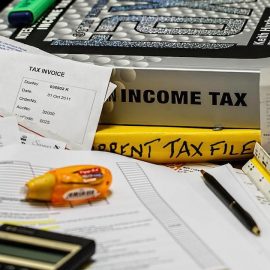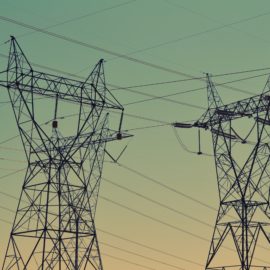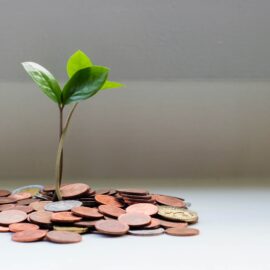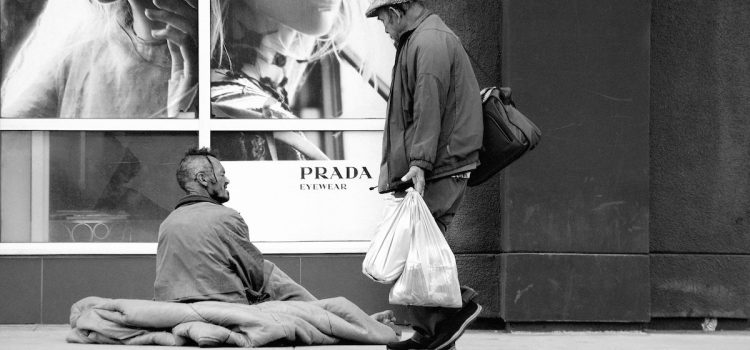
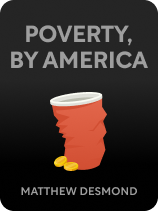
Este artigo é um trecho do guiaShortform para “Poverty, by America” (Pobreza, pela América), de Matthew Desmond. Shortform os melhores resumos e análises do mundo sobre livros que você deveria ler.
Gostou deste artigo? Inscreva-se para uma avaliação gratuita aqui.
Por que algumas pessoas são pobres? Elas estão se mantendo na pobreza ou são vítimas de outras pessoas que não querem que elas tenham sucesso?
Em Poverty, by America(Pobreza, pela América), o cientista social Matthew Desmond explora como e por que as explicações comumente citadas para a pobreza não se sustentam. Em seguida, ele volta sua atenção para o que acredita ser a verdadeira razão para a persistência da pobreza nos Estados Unidos.
Continue lendo para saber por que Desmond acredita que a exploração dos pobres é uma realidade nos Estados Unidos.
Exploração dos pobres
Desmond escreve que a principal força que perpetua a pobreza são os americanos não pobres que se beneficiam de manter seus compatriotas na pobreza. Segundo Desmond, trata-se de uma história de apropriação e exploração dos pobres, em que as escolhas feitas por indivíduos e pela sociedade em geral contribuem para a miséria de milhões de pessoas.
| A riqueza causa pobreza? Desmond argumenta que a riqueza de alguns americanos vem às custas da pobreza de outros. Mas essa análise não é simplista demais? Alguns argumentam que a verdadeira relação entre riqueza e pobreza é mais complicada. De acordo com esse argumento, o aumento da riqueza entre os indivíduos mais ricos do mundo não ocorre necessariamente às custas dos pobres: à medida que os super-ricos acumulam riqueza, isso geralmente é resultado da criação de novos negócios, inovações e empregos que podem ajudar a aliviar a pobreza . Notavelmente, há uma distinção entre a riqueza criada por meio da inovação e das atividades empreendedoras e a riqueza acumulada por meio da exploração e da corrupção. Embora haja um problema com a desigualdade de riqueza em casos de capitalismo de compadrio ou busca de rendimentos econômicos, os críticos do argumento de que “a riqueza causa pobreza” dizem que atacar a existência da riqueza em si é equivocado. Em vez disso, o foco deve ser abordar as causas profundas da pobreza, como corrupção, falta de acesso à educação e saúde e barreiras às oportunidades econômicas. |
Exploraremos as escolhas que fazemos para criar a pobreza dos outros, incluindo nossas demandas como consumidores por produtos baratos e serviços convenientes, como e onde investimos nosso dinheiro e onde escolhemos morar. Também exploraremos alguns dos modos mais específicos de exploração, incluindo a cobrança abusiva de aluguéis por proprietários inescrupulosos, o sistema bancário paralelo predatório e a discriminação habitacional.
#1: As consequências das nossas escolhas de consumo
Desmond escreve que as escolhas que fazemos como consumidores contribuem para a pobreza de outras pessoas.
Muitas dessas escolhas estão relacionadas às nossas demandas por produtos baratos e às nossas expectativas de atendimento e entrega instantâneos desses produtos. Os preços baixos e as entregas no mesmo dia oferecidas por gigantes do comércio eletrônico, como a Amazon, ou serviços de entrega de comida, como o Seamless, não são possíveis apenas por causa da inovação tecnológica. Em vez disso, escreve Desmond, por trás dessas conveniências está uma vasta classe baixa de motoristas mal remunerados, trabalhadores de cozinha explorados e funcionários de armazéns não sindicalizados. Sua pobreza e exploração são os custos ocultos do nosso conforto material.
| Os consumidores estão dispostos a pagar mais por produtos fabricados em condições de trabalho justas? Embora Desmond afirme que a demanda dos consumidores por produtos baratos alimenta a exploração do trabalho, algumas pesquisas sugerem que existe uma demanda substancial por produtos fabricados em condições de trabalho justas. Muitos consumidores estão dispostos a pagar um preço mais alto por esses produtos. No entanto, essa demanda não é uniforme entre todos os consumidores, mas é influenciada por vários fatores, incluindo renda, educação e ideologia política. Consumidores com renda mais alta, maior nível de educação e visões políticas de esquerda são mais propensos a valorizar práticas trabalhistas justas e expressar disposição para pagar a mais por produtos produzidos de forma ética. Além disso, as preferências por práticas trabalhistas justas têm um impacto mais significativo em certos setores, como o de vestuário e eletrônicos, que são mais intensivos em mão de obra e propensos a enfrentar questões relacionadas aos direitos trabalhistas. |
#2: Decisões de investimento e privilégios
De acordo com Desmond, também contribuímos para a pobreza através das nossas decisões de investimento.
As empresas mais lucrativas para investir e comprar ações são frequentemente aquelas que aumentam suas margens de lucro mantendo os trabalhadores mal remunerados, sem representação sindical e trabalhando em condições precárias e inseguras. Quando você investe nessas empresas — seja você um corretor de ações ativo ou apenas investindo passiva e indiretamente nelas por meio de uma conta de aposentadoria como um 401k — você está recompensando essas empresas por explorar seus trabalhadores e lucrando com essa exploração.
| Faz diferença desinvestir em empresas irresponsáveis? Embora Desmond critique os indivíduos por investirem em empresas que exploram sua força de trabalho, alguns estudiosos afirmam que as campanhas de desinvestimento, nas quais acionistas individuais se desfazem das ações dessas empresas, têm pouco efeito sobre o desempenho financeiro delas. Em alguns casos, isso pode até beneficiá-las , pois outros investidores que não compartilham das mesmas preocupações podem ver uma oportunidade de comprar ações subvalorizadas, potencialmente estabilizando ou até mesmo aumentando o preço das ações. Esses críticos escrevem que o desinvestimento é frequentemente uma forma de protesto simbólico e expressão moral, e as consequências econômicas reais para as empresas visadas podem ser limitadas. Em vez disso, o envolvimento dos acionistas pode ser uma estratégia alternativa ao desinvestimento, em que os investidores usam sua influência como acionistas para se envolver com as empresas e incentivar mudanças positivas em suas práticas. Essa abordagem pode ser mais eficaz para promover mudanças corporativas sustentáveis. |
#3: Mantendo os pobres fora dos nossos bairros
Desmond escreve que os locais que escolhemos para viver e as regras locais de habitação que criamos contribuem fortemente para a pobreza enraizada.
Bairros mais ricos costumam aprovar leis de zoneamento que proíbem a construção de casas multifamiliares e prédios de apartamentos. Como esses últimos tipos de moradia tendem a ser mais acessíveis, essas políticas têm o efeito de excluir as pessoas pobres dos bairros mais ricos, prendendo-as em comunidades pobres com pobreza geracional.
Essas políticas também mantêm baixa a oferta de moradias disponíveis e acessíveis. Isso significa que elas aumentam o custo da moradia e protegem os investimentos imobiliários dos proprietários atuais — outra maneira pela qual nossas escolhas de estilo de vida aumentam nosso conforto material às custas dos pobres.
Aluguéis e proprietários
Desmond escreve que um dos efeitos dessas políticas de zoneamento excludentes é concentrar as pessoas pobres — que são desproporcionalmente negras e latinas — em bolsões de pobreza, muitas vezes em favelas urbanas. E essas favelas urbanas são frequentemente uma mina de ouro para os proprietários, que cobram aluguéis mais altos por prédios e apartamentos em ruínas em comparação com os de bairros mais ricos.
Isso ocorre porque os proprietários podem extrair cada centavo de imóveis antigos e inadequados, dividindo-os em apartamentos cada vez menores para pessoas que não têm outra opção de moradia. O desespero e a impotência dos inquilinos é o que permite aos proprietários explorá-los dessa forma. De fato, escreve Desmond, em muitas partes dos Estados Unidos é mais lucrativo ser proprietário em um bairro pobre do que em um bairro rico. A situação só piorou desde 2000, com o aluguel médio aumentando mais de duas vezes e meia — superando em muito a inflação e os magros aumentos salariais durante esse período.
Nº 4: O sistema bancário paralelo
Outra forma pela qual o sistema econômico explora os pobres é através do sistema de “banca paralela”. De acordo com Desmond, muitas pessoas em situação de pobreza se veem excluídas do sistema bancário tradicional por não terem crédito ou a documentação adequada para abrir contas. Consequentemente, opções de sistema bancário paralelo, como empréstimos consignados e casas de câmbio, entram em cena para preencher essa lacuna. Elas cobram taxas e tarifas exorbitantes, arrecadando efetivamente cerca de US$ 61 milhões por dia dos americanos mais pobres. Desmond escreve que isso equivale essencialmente ao roubo de mão de obra.
E, observa ele, é um ciclo que se autoalimenta. O crédito ruim decorrente da pobreza obriga as pessoas a recorrerem mais a opções bancárias marginais, cujas taxas de juros exorbitantes as levam a uma pobreza ainda maior. Tudo isso cria um setor lucrativo para os credores.
| O caso dos credores de empréstimos consignados Embora Desmond condene as práticas dos credores de empréstimos consignados e outros serviços financeiros que operam separadamente das instituições financeiras tradicionais, alguns autores afirmam que eles são uma tábua de salvação vital para os trabalhadores e as pessoas pobres. Em Hillbilly Elegy, JD Vance — que se tornou senador dos EUA — escreve que, durante seus anos de graduação, enquanto trabalhava para um legislador estadual na capital do estado de Ohio, ele passou a compartilhar as visões políticas conservadoras de seu chefe. Em particular, eles compartilhavam a oposição a um projeto de lei para coibir as práticas de empréstimos consignados. Vance escreve que seu chefe foi um dos poucos legisladores a se opor à medida. Vance lembra que, ocasionalmente, recorria a empréstimos consignados para cobrir despesas básicas, assim como muitas pessoas em sua comunidade. Ele escreve que , sem eles, essas pessoas teriam ficado com suas contas bancárias no vermelho e enfrentado consequências financeiras potencialmente piores do que os juros dos empréstimos. Para ele, o problema era que políticos bem-intencionados estavam promovendo medidas que, na verdade, prejudicariam as mesmas pessoas que pretendiam ajudar. Ao examinar sua evolução política, Vance vê o projeto de lei contra os empréstimos consignados como uma experiência que consolidou seu compromisso com o conservadorismo de livre mercado e sua rejeição ao liberalismo do estado de bem-estar social, bem-intencionado, mas, em última análise, equivocado. |
Exercício: Compreenda seu papel na perpetuação da pobreza
Explore como suas escolhas como cidadão, eleitor e consumidor podem contribuir para a perpetuação da pobreza.
- Quais são os principais fatores que Matthew Desmond discute no livro como contribuintes para a pobreza nos Estados Unidos e como você acha que esses fatores se manifestam em sua vida ou comunidade? Explique sua resposta. (Por exemplo, você pode refletir se você ou pessoas da sua comunidade já passaram por situações de insegurança habitacional, como mudanças frequentes ou dificuldade para pagar o aluguel.)
- De que forma as políticas habitacionais, conforme descritas no livro, perpetuam a pobreza, e qual o papel que você acredita desempenhar na defesa de mudanças nessas políticas? (Por exemplo, você pode refletir se pode apoiar ou participar de esforços para combater a discriminação habitacional e promover práticas habitacionais justas.)
- O livro destaca as dificuldades enfrentadas por pessoas que vivem na pobreza. Como você acha que pode se envolver com essas pessoas? Que ações específicas você poderia tomar? (Por exemplo, você poderia oferecer seu tempo e suas habilidades como voluntário para organizações locais que apoiam pessoas e famílias de baixa renda. Isso poderia envolver trabalhar em bancos de alimentos, abrigos para moradores de rua ou programas de alfabetização.)
- O ciclo da pobreza geralmente envolve acesso limitado à educação e oportunidades de emprego. Como você pode apoiar iniciativas de educação e treinamento profissional que ajudam as pessoas a sair da pobreza? (Por exemplo, você pode oferecer seu tempo para orientar ou dar aulas particulares a pessoas que desejam melhorar sua educação. Isso pode incluir ajudar com os deveres de casa, fornecer orientação profissional ou ajudar na elaboração de currículos e no desenvolvimento de habilidades para entrevistas.)

---Fim da visualização---
Gostou do que acabou de ler? Leia o restante do melhor resumo e análise do livro de Matthew Desmond, “Poverty, by America” (Pobreza, pela América), na Shortform.
Aqui está o que você encontrará em nosso resumo completo de Pobreza, pela América:
- Por que os Estados Unidos sofrem com tanta pobreza e desigualdade
- Como alguns americanos se beneficiam da pobreza dos outros
- Como podemos empoderar os pobres e erradicar a pobreza

